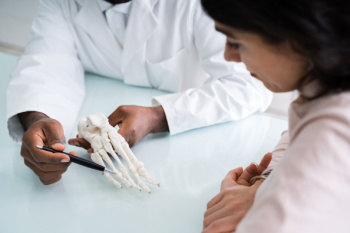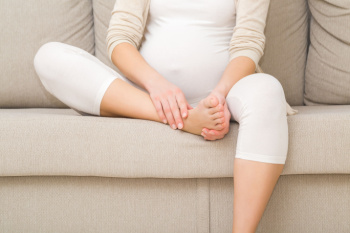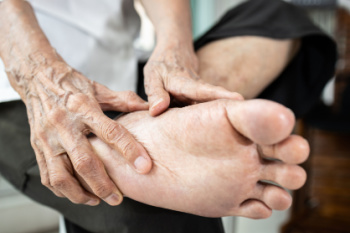Items filtered by date: March 2024
How Freiberg's Disease Affects Teens

Freiberg's disease is characterized by cartilage degeneration in the lesser metatarsal heads of the feet, notably affecting adolescent females, though it can occur in both genders later in life. The condition primarily involves the second and third metatarsals. While the exact cause remains unclear, vascular problems, genetic predisposition, and altered biomechanics are common causes. Diagnosis by a podiatrist includes clinical evaluation and imaging confirmation. In many cases X-rays show normal bone formation in early stages and flattened, fragmented metatarsal heads as the disease progresses. Treatment focuses on relieving foot pressure and may involve nonoperative measures such as activity modification and custom orthotic support. Surgical interventions are considered for advanced cases. Outcomes for Freiberg’s disease from both nonoperative and operative management are generally favorable, allowing most patients to resume previous activities. To find out what may be causing metatarsal foot pain, it is suggested that you make an appointment with a podiatrist.
Some foot conditions may require additional professional care. If you have any concerns, contact Henrietta Obidigbo, DPM of Jersey Foot and Ankle Clinic. Our doctor can provide the care you need to keep you pain-free and on your feet.
Rare Foot Conditions
The majority of foot conditions are common and can be treated by a podiatrist. Standard diagnostic procedures are generally used to identify specific conditions and treatment can be rendered. A podiatrist also treats rare foot conditions which can be difficult to diagnose and may need extra attention and care.
There are many rare foot conditions that can affect children. Some of these can include:
- Freiberg’s disease
- Kohler’s disease
- Maffucci syndrome
Freiberg’s disease - This can be seen as a deterioration and flattening of a metatarsal bone that exists in the ball of the foot. It typically affects pre-teen and teenage girls, but can affect anyone at any age. Symptoms that can accompany this can be swelling, stiffness, and the patient may limp.
Kohler’s disease - This often targets the bone in the arch of the foot and affects younger boys. It can lead to an interruption of the blood supply which ultimately can lead to bone deterioration. The patient may limp or experience tenderness, swelling, and redness.
Maffucci syndrome - This affects the long bones in a child’s foot leading to the development of abnormal bone lesions. They are benign growths and typically develop in early childhood and the bones may be susceptible to breaking.
A podiatrist can properly diagnose and treat all types of rare foot conditions. If your child is affected by any of these symptoms or conditions, please don’t hesitate to call our office so the correct treatment method can begin.
If you have any questions please feel free to contact our office located in Freehold, NJ . We offer the newest diagnostic tools and technology to treat your foot and ankle needs.
Why Live with Pain and Numbness in Your Feet?
What Podiatrists Do

Podiatrists are healthcare professionals specializing in diagnosing, treating, and preventing conditions affecting the feet, ankles, and lower extremities. They provide comprehensive care for foot-related issues, including injuries, deformities, infections, and chronic conditions like diabetes. Podiatrists can help people of all ages, from children to the elderly, offering services such as routine foot care, orthotic prescriptions, wound care, and surgical interventions when necessary. Unlike medical doctors, MDs, who focus on the entire body, podiatrists, DPMs, focus exclusively on the lower extremities, allowing them to develop specialized expertise in foot and ankle care. Their training includes four years of podiatric medical school followed by residency programs, equipping them with the knowledge and skills to address a wide range of podiatric issues effectively. If you are experiencing foot pain, discomfort, or any abnormalities in foot structure or function, it is suggested that you make an appointment with a podiatrist for a diagnosis and treatment.
If you are experiencing pain in the feet or ankles, don’t join the stubborn majority refusing treatment. Feel free to contact Henrietta Obidigbo, DPM from Jersey Foot and Ankle Clinic. Our doctor can provide the care you need to keep you pain-free and on your feet.
What Is a Podiatrist?
Someone would seek the care of a podiatrist if they have suffered a foot injury or have common foot ailments such as heal spurs, bunions, arch problems, deformities, ingrown toenails, corns, foot and ankle problems, etc.
Podiatric Treatment
A podiatrist will treat the problematic areas of the feet, ankle or lower leg by prescribing the following:
- Physical therapy
- Drugs
- Orthotic inserts or soles
- Surgery on lower extremity fractures
A common podiatric procedure a podiatrist will use is a scanner or force plate which will allow the podiatrist to know the designs of orthotics. Patients are then told to follow a series of tasks to complete the treatment. The computer will scan the foot a see which areas show weight distribution and pressure points. The podiatrist will read the analysis and then determine which treatment plans are available.
If you have any questions please feel free to contact our office located in Freehold, NJ . We offer the newest diagnostic and treatment technologies for all your foot and ankle needs.
Understanding Foot Changes During Pregnancy

Pregnancy is a transformative journey marked by numerous bodily changes, including those affecting the feet. As the body undergoes hormonal shifts and weight gain, the feet bear the brunt of these transformations, often resulting in the development of various foot conditions. Swelling, or edema, is a common occurrence due to fluid retention, causing the feet to appear puffy and uncomfortable. Additionally, the increased pressure on the arches may lead to the onset or exacerbation of conditions such as plantar fasciitis or flat feet. Hormonal changes can also impact ligaments and joints, potentially causing instability and discomfort in the ankles and feet. To mitigate these issues, pregnant individuals are advised to wear supportive footwear, elevate their feet when possible, and engage in gentle exercises to improve circulation and alleviate swelling. If you have developed foot conditions during your pregnancy, it is suggested that you schedule an appointment with a podiatrist who can guide you toward finding relief.
Pregnant women with swollen feet can be treated with a variety of different methods that are readily available. For more information about other cures for swollen feet during pregnancy, consult with Henrietta Obidigbo, DPM from Jersey Foot and Ankle Clinic. Our doctor will attend to all of your foot and ankle needs.
What Foot Problems Can Arise During Pregnancy?
One problem that can occur is overpronation, which occurs when the arch of the foot flattens and tends to roll inward. This can cause pain and discomfort in your heels while you’re walking or even just standing up, trying to support your baby.
Another problem is edema, or swelling in the extremities. This often affects the feet during pregnancy but tends to occur in the later stages.
How Can I Keep My Feet Healthy During Pregnancy?
- Wearing orthotics can provide extra support for the feet and help distribute weight evenly
- Minimize the amount of time spent walking barefoot
- Wear shoes with good arch support
- Wear shoes that allow for good circulation to the feet
- Elevate feet if you experience swelling
- Massage your feet
- Get regular, light exercise, such as walking, to promote blood circulation to the feet
If you have any questions please feel free to contact our office located in Freehold, NJ . We offer the newest diagnostic and treatment technologies for all your foot and ankle needs.
Foot Pain as an Early Sign of Rheumatoid Arthritis
 Foot pain can serve as an early warning sign of rheumatoid arthritis, or RA, a chronic autoimmune condition that affects joints. RA can affect the small joints in the feet, leading to swelling, tenderness, and stiffness. For many patients, the feet are the first site of RA-associated joint pain. People may experience pain in the joints of the toes or the middle of the foot, which is often worse in the morning. Typically, both feet are affected. Early intervention is important, as RA can progress to affect multiple joints, which leads to deformities and functional limitations. If you have foot pain or diagnosed rheumatoid arthritis, it is suggested you are under the care of a podiatrist who can offer tailored treatment for the feet.
Foot pain can serve as an early warning sign of rheumatoid arthritis, or RA, a chronic autoimmune condition that affects joints. RA can affect the small joints in the feet, leading to swelling, tenderness, and stiffness. For many patients, the feet are the first site of RA-associated joint pain. People may experience pain in the joints of the toes or the middle of the foot, which is often worse in the morning. Typically, both feet are affected. Early intervention is important, as RA can progress to affect multiple joints, which leads to deformities and functional limitations. If you have foot pain or diagnosed rheumatoid arthritis, it is suggested you are under the care of a podiatrist who can offer tailored treatment for the feet.
Because RA affects more than just your joints, including the joints in your feet and ankles, it is important to seek early diagnosis from your podiatrist if you feel like the pain in your feet might be caused by RA. For more information, contact Henrietta Obidigbo, DPM of Jersey Foot and Ankle Clinic. Our doctor will assist you with all of your podiatric concerns.
What Is Rheumatoid Arthritis?
Rheumatoid Arthritis (RA) is an autoimmune disorder in which the body’s own immune system attacks the membranes surrounding the joints. Inflammation of the lining and eventually the destruction of the joint’s cartilage and bone occur, causing severe pain and immobility.
Rheumatoid Arthritis of the Feet
Although RA usually attacks multiple bones and joints throughout the entire body, almost 90 percent of cases result in pain in the foot or ankle area.
Symptoms
- Swelling and pain in the feet
- Stiffness in the feet
- Pain on the ball or sole of feet
- Joint shift and deformation
Diagnosis
Quick diagnosis of RA in the feet is important so that the podiatrist can treat the area effectively. Your doctor will ask you about your medical history, occupation, and lifestyle to determine the origin of the condition. Rheumatoid Factor tests help to determine if someone is affected by the disease.
If you have any questions please feel free to contact our office located in Freehold, NJ . We offer the newest diagnostic and treatment technologies for all your foot and ankle needs.





